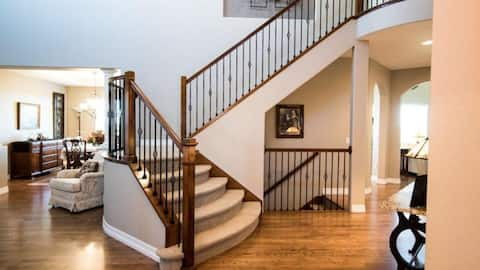Feng Shui tips for house planning
What's the story
In the pursuit of a balanced and harmonious living space, many turn to the ancient art of Feng Shui. Originating from China over 3,000 years ago, Feng Shui is a practice that seeks to harmonize individuals with their environment by arranging decor, and architectural elements in a way that promotes positive energy flow. Here are some tips to consider when planning your home's layout.
Bagua map
What is a Bagua map?
The Bagua map is used in Feng Shui, to divide a space, such as a room or a home, into nine sections, each representing different aspects of life, such as career, wealth, relationships, and health. These sections correspond to specific areas of the individual's life and are used to analyze and enhance the energy flow within the space to promote balance and well-being.
Entry
Entrance assessment
In Feng Shui philosophy, the entryway represents your face to the world. Unless you're seeking seclusion, it's important to choose a home with a clear, easy-to-find entrance. Upon arrival at your home, take note of the visibility of the front door, the functionality of the doorbell, and the cleanliness and lighting of the area. The front entrance and foyer must be open and spacious.
Room placement
Front and rear
Ideally, public areas like the kitchen, living room, and home office are positioned near the front door for accessibility and sociability. Private rooms, such as bedrooms, are best located towards the back, offering seclusion. Traditionally, elders occupy the rear, symbolizing safety and authority. In Feng Shui, proximity to the front signifies social engagement, while the back implies greater control and influence.
Kitty corner
Commanding position
According to Feng Shui principles, the bed, desk, and stove hold significant influence in a home. The bed symbolizes you, the desk represents your career, and the stove signifies wealth and nourishment. Achieving a commanding position for these elements entails placing them where they can be seen from the door without being directly in line, often at a diagonal or "kitty-corner" orientation.
Tai-qi
Center is key
The center of a home influences the well-being of its occupants, representing the health or "tai qi" area in the Bagua map, which divides a space into nine separate areas each relating to a certain theme. It is advisable to avoid placing a staircase or bathroom in this pivotal space, as these can disrupt the flow of energy and affect overall household balance.
Staircase
Avoid spirals
Spiral staircases are discouraged due to their disorienting nature and the rapid energy they generate. Additionally, numerous stairs, as seen in split-level homes, can symbolize instability in life. Stairs located in close proximity to the front door, directly facing it, or at the central axis of the home can present obstacles by interrupting the natural flow of energy within the space.
